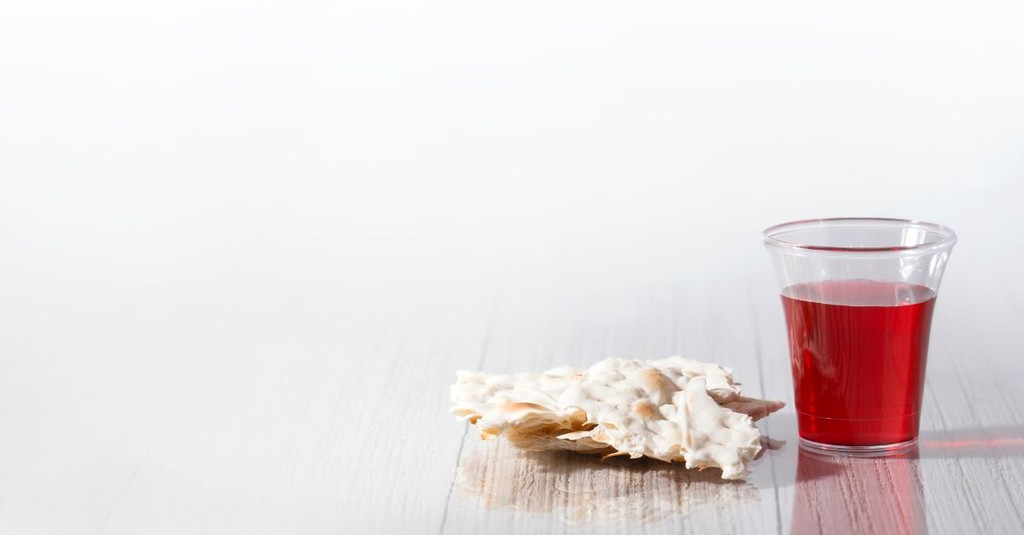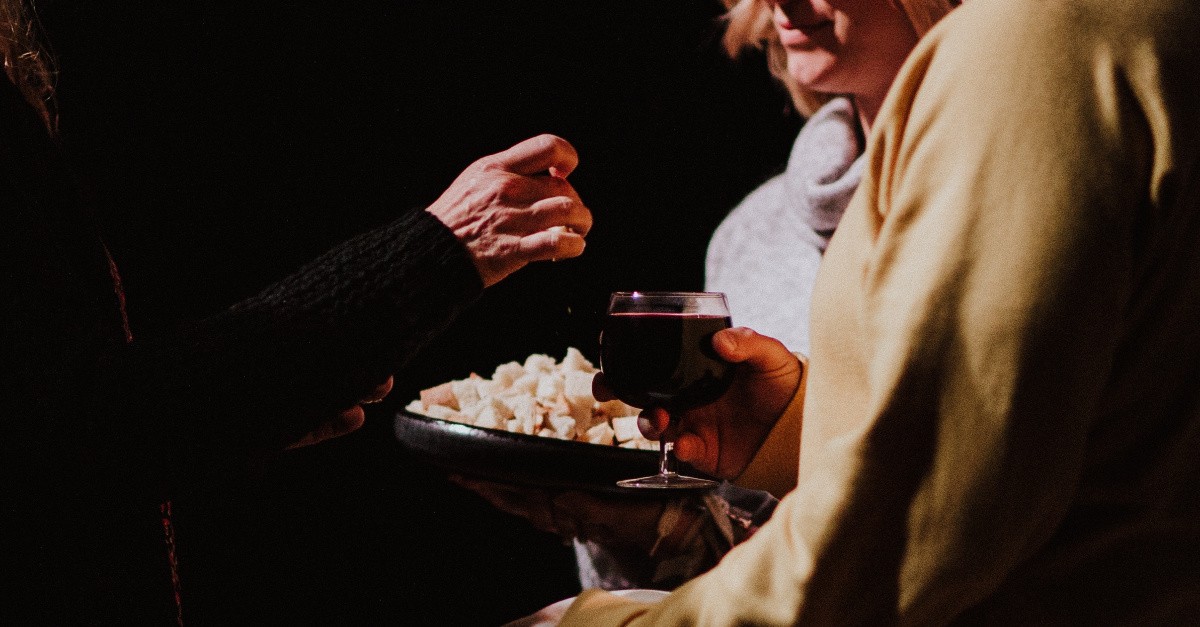
The act of fellowshipping with other believers and taking communion seems simple at the surface level. We share food and drink as we pray, read Scripture, and worship. Yet, in the mystery and beauty of communion, ordinary things like bread and wine represent something extraordinary. We receive a tangible representation of Jesus’ body in the broken bread and His blood in the drink.
In this mixture of mystery and beauty, Christians throughout time have developed doctrines based on their thoughts about communion and what it means biblically. This is why some traditions and denominations overemphasize certain parts of the Eucharist or interpret the elements in various ways. For example, the reformers developed different views of communion, even though they jointly disagreed with the Roman Catholic position. As a result, today, we have an assortment of teachings about communion, what it means, and how to take it.
So, how do we know what is correct?
Like any issue, we must compare our views and assumptions, even deeply held ones, to what Scripture teaches. Here are five such assumptions that Christians get wrong about communion.
Photo Credit: Jenniveve84 from Getty Images via Canva Pro

1. Unleavened Bread Is Required for Communion
Since Jesus instituted the practice of communion at the Last Supper, the type of bread He used was the unleavened bread of the Passover meal. Some Christians believe that this means the only biblical bread option during communion is unleavened bread, whether in pieces from a round, flat loaf or small wafers. To these believers, anything with yeast would be unsuitable for remembering Christ’s sacrifice.
The Israelites used unleavened bread during Passover to signify their quick escape from Egypt (Exodus 12:15-20, 39). Many Churches have adopted this type of bread as part of their observance of the Lord’s Supper. Not only do they believe that it has biblical grounds based on the type of bread Jesus gave the disciples, but also because the New Testament compares leaven or yeast to sin (1 Corinthians 5:6-7).
However, Scripture does not tell us if we should use leavened or unleavened bread for communion. This is important to note because the type of bread we use is not the focus of communion. Jesus broke the bread at the Last Supper and gave it to the disciples. Then He said, “This is my body given for you; do this in remembrance of me” (Luke 22:19, NIV; also see Matthew 26:26 and Mark 14:22). The bread symbolizes Jesus’ body given for our sake. On its own, it is merely a piece of bread. Whether we use unleavened or leavened bread, our focus should be on Christ.
Reflecting on Jesus’ sacrifice is far more important than the type of bread of bread we use.
Photo Credit: valentynsemenov via Canva Pro

2. Wine Is the Only Acceptable Option for the Drink Element
Like the question of the type of bread, many Christians also hold rigid rules about the drink element of communion. Some argue that wine is the only acceptable choice for communion, as Jesus gave the disciples wine, not fruit juice. He specifically said He would not drink of the fruit of the vine until He drank again with the disciples in His Father’s Kingdom (see Matthew 26:29).
Although wine has been the traditional choice since the early church, it is certainly not the only option. The Bible does not provide any rules that say we must use wine. Fruit juice, specifically grape juice, has been used by many different denominations as a suitable substitute. At times, this could be the wisest option to give, especially if members of the church have struggled with alcohol addiction or are uncomfortable consuming alcohol as a matter of conscience.
In some churches, people can hold just as rigid rules about only consuming grape juice, not wine, as an element of communion. A bias in either direction is wrong. One should not feel guilty for drinking wine as part of the Lord’s Supper, just as another person should not feel ashamed for having grape juice. When we hyperfocus on the elements (the wine and bread), we miss the true meaning of the ordinance of communion.
The drink symbolizes Christ’s blood poured out for us. Whether we drink wine or fruit juice, we should reflect on the significance of the sacrifice Jesus made to redeem us. When we drink from the cup, our focus should be on His words: “This is my blood of the covenant, which is poured out for many for the forgiveness of sins” (Matthew 26:28, NIV).
Photo Credit: ©iStock/Getty Images Plus/pamela_d_mcadams

3. Partaking in Communion Is Required for Salvation
Certain churches teach that taking communion or the Eucharist is necessary for salvation. This teaching stems largely from a church’s theology and tradition, which affects its view of the Eucharist's elements.
Those who hold to sacramentalism (that sacraments like the Eucharist confers grace) argue that a person must partake in the Eucharist to be saved. They believe that Scripture supports this view since it refers to eating Jesus’ flesh and drinking His blood as required for receiving salvation (see John 6:53-55). Roman Catholics, for instance, insist that when the bread and wine are consecrated, the elements become changed and are truly the blood and body of Christ. Thus, they consume Jesus’ flesh and blood, in apparent alignment with Scripture’s teaching.
Jesus did say, “Whoever eats my flesh and drinks my blood has eternal life, and I will raise them at the last day” (John 6:54, NIV). However, He was not talking in terms of implementing communion. Instead, He spoke metaphorically of His death on the cross. At the crucifixion, Jesus offered His body and blood for our salvation. We “eat” and “drink” this sacrifice by trusting Him for salvation. In this way, He is the Bread of Life who gives us everlasting life (John 6:35, 58).
If we had to do something else for salvation (i.e., communion, baptism, etc.), then salvation would not be by grace. As it is, no one is saved by doing deeds or religious practices (Ephesians 2:8-9). We are saved by trusting in the death and resurrection of Jesus. Nothing else is required for us to receive the gift of eternal life.
Of course, believers should want to participate in communion. Christ told us to “do this in remembrance of me” (Luke 22:19). However, it is not a requirement for salvation.
Photo Credit: Priscilla du Preez/Unsplash

4. Communion Is Not a Big Deal
The early church observed communion every week. This was an important part of their worship and fellowship together. The church did not treat communion casually despite the regular occurrence of partaking in the bread and wine.
The Apostle Paul emphasized the seriousness of the Lord's Supper. Many in the Corinthian church had brought judgment on themselves for irreverently taking the bread and wine. Many of them had experienced illnesses and weakness, and some had even died (1 Corinthians 11:30-32). As Paul wrote, "Whoever, therefore, eats the bread or drinks the cup of the Lord in an unworthy manner will be guilty concerning the body and blood of the Lord" (1 Corinthians 11:27, NIV). Believers today can still experience this judgment.
Modern-day Christians should carefully examine themselves before taking communion (1 Corinthians 11:28). Is there any unrepentant sin in our lives? Are we treating the Eucharist irreverently? If we realize a sin is causing a problem in our lives and we have not repented, then we should not take communion at that time.
In addition to the biblical warnings, the symbolism of the bread and wine is a reason to take communion seriously. We remember what Jesus did to save us by partaking in the Eucharist. He laid down His life, taking the punishment we deserve to receive forgiveness of sins and eternal life (see John 10:11, 28). This sacrifice is not something to treat lightly. For truly, what we believe about Jesus, His death and resurrection, is a matter of life and death.
Another reason to treat this ordinance carefully and thoughtfully is the visual testimony the church gives to others through communion. By taking the bread and wine, we "proclaim the Lord's death until he comes" (1 Corinthians 11:26, NIV). We are not only giving a visual representation of the gospel, but we also look forward to His second coming.
Photo Credit: doidam10 from Getty Images via Canva Pro

5. The Communion Table Is Open to Everyone
In wanting to be inclusive, some churches offer communion to all people, even visitors and children. No thought is given to whether these people can biblically eat from the bread and drink from the cup. Opening the communion table to everyone may seem loving and welcoming, but it is dangerous.
Only believers can participate in this ordinance. Non-Christians visiting the church should be kept from participating in the Eucharist because they have not placed faith in Christ. As should any children who have not reached the age where they can understand and accept the gospel or are older but have not yet been saved.
Allowing them to participate does not align with the Bible. The symbols of Jesus’ body and blood given would not mean anything to them because unbelievers have not trusted in Christ. Also, if believers risk bringing judgment on themselves for taking communion in an unworthy manner, then unbelievers are at more risk of judgment (1 Corinthians 11:27, 30). We should not allow them to be put in such a dangerous position.
For this reason, pastors or priests need to ensure that only believers partake in communion at their church. They should give a warning before passing around the elements and make clear to all people present, including visitors, that taking the bread and wine is only for individuals who have trusted in Jesus’ death and resurrection for salvation.
Non-Christians can undoubtedly watch the church’s proclamation of Jesus’ sacrificial death. However, we should protect them from incurring judgment by not allowing them to eat the bread and drink the wine (or juice).
Communion is both a celebration and a solemn occasion. As we eat and drink, we rejoice in what Jesus did for us on the cross. However, we should also treat this ordinance with deep seriousness. We are wise to examine and discern ourselves before partaking in the Eucharist, even as we rejoice in our salvation in Christ.
Photo Credit: © Unsplash/Shaun Frankland

Originally published Monday, 25 March 2024.
